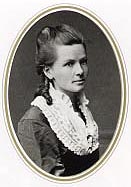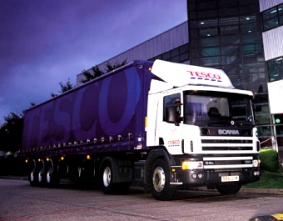 News of May 16, 1999
(the
 will lead you to the full article)
Page 4 of 6 will lead you to the full article)
Page 4 of 6
.
150th Birthday
of Bertha Benz
|
 Stuttgart, May 3, 1999
- Bertha Ringer was born in Pforzheim on May 3, 1849 and was 23 when she married Karl Benz
on July 20, 1872. She passed away 55 years ago, on May 5, 1944, two days after celebrating
her 95th birthday in Ladenburg, in the state of Baden, where the family finally settled. Stuttgart, May 3, 1999
- Bertha Ringer was born in Pforzheim on May 3, 1849 and was 23 when she married Karl Benz
on July 20, 1872. She passed away 55 years ago, on May 5, 1944, two days after celebrating
her 95th birthday in Ladenburg, in the state of Baden, where the family finally settled.
History is punctuated by the efforts of committed women who have
made significant contribution to the life's work of their famous husbands. One such figure
is Bertha Benz, the resolute lifetime companion of Karl Benz, the father of the
automobile. |
 Bertha Benz |
| Without her strong will and unshakeable belief in the success
of her husband - and a healthy dose of nerve -- the Benz company may never have prospered.
Berha Benz gave her husband all the support she could, driving him on when the brilliant
inventor and design engineer suffered serious technical setbacks and increasing self-doubt
about the direction his life's work was taking. Even during the engagement before her
marriage to Karl Benz, Bertha made a determined and selfless decision which was to prove
crucial to her husband-to-be. When it was revealed that Karl Benz had been maneuvered into
an almost untenable financial situation by a business partner, Bertha Benz barely
hesitated before prematurely paying in her dowry. Although not a huge amount of money, it
was enough to buy out the partner and secure all future decision-making powers for Karl
Benz.
Although his work was constantly afflicted by one setback or another, Karl Benz was
given constant strength by Bertha's unshakeable belief in him and his invention and pushed
on regardless. On January 29, 1886 he applied for a patent for his three-wheeler with a
gas engine. This represented an important historical milestone, in which Bertha Benz
played a considerable role.
The patent specification (DRP. No. 37435) is recognized today as the birth certificate
of the automobile. Karl Benz went on to build further, perfected versions of his
"patent motor car." Despite a mostly enthusiastic reception from the public, the
commercial success he craved remained elusive.
Once again he became wracked by self-doubt and again it was his wife who found a way
out. She realized that the general public remained inherently suspicious about the
feasibility and reliability of this driving machine, which people saw as powered by
secretive, "devilish" forces. The dynamic Bertha reasoned that the only way to
convince people that the motor car would actually work was to prove it to them in
practice.
Early one August morning in 1888 -- and without the knowledge of her husband -- she set
off in Karl's three-wheeler with the couple's two sons on the journey from Mannheim to
Pforzheim. As darkness fell, the intrepid trio arrived safe and well in Pforzheim. They
then sent Karl a telegram to tell him that they had successfully completed the first
long-distance journey in his motor car.
News of this sensational event spread like wildfire. Two kids and a woman in a hissing
and snarling, horseless carriage - it had to be the work of the devil incarnate! Yet,
Bertha Benz had achieved what she had set out to do.
The critics were won over by the reliability of the Benz motor car and it had become
the talk of the town. Karl Benz was later to write in his memoirs: "Only one person
stood by me during those times when I was heading towards the abyss. That was my wife.
With her bravery and courage she could always find new hope."
|
| Ford finalist for
Smithsonian Award
May 7, 1999 -- Ford Motor Company has been named one of five finalists
for a 1999 Computerworld Smithsonian Award in the category of
Manufacturing. Established
in 1989, the Computerworld Smithsonian Awards Program was created to search out and
publicly honor individuals and companies whose use of information technology produces
positive social, economic and educational change. Other Computerword Smithsonian Award
finalists in the Manufacturing category are: The Boeing Company, Cisco Systems, Georg
LingenbrickGmbH & Co, and Bath Ironworks. The winners will be announced at an annual
gala on Monday, June 7, at the National Building Museum in Washington, D.C. Information on
Ford's innovative use of the Internet have been added to the Permanent Research Collection
on Information Technology at the Smithsonian.
Ford is being recognized specifically for leveraging information technology and the
Internet to manufacture and deliver its vehicles on a customer-demand basis, substantially
shortening the order-to-delivery process to create automobiles on demand.
"A completely new approach to the customer purchase experience, revolving around
using high-speed communications, data analysis and the Internet is changing the way people
buy vehicles and related services from Ford," said Bud Mathaisel, chief information
officer, Ford Motor Company "This new approach will help Ford become the leading
consumer company for automotive products and services."
Ford has made the automobile purchase experience as simple as logging onto the
Internet. "The impact of the Internet is profound," Mathaisel said. "It
provides us with the perfect medium to listen to our consumers and provide them with the
exact information and vehicle they want."
Consumers can virtually specify and order the exact vehicle they
want, arrange for
financing and obtain a delivery date—plus receive continuing e-mail
updates.
"These emerging technologies are helping Ford connect with current and potential
customers and anticipate their present and future needs," he
said.
|
Another
600 Scania trucks for Tesco in UK
|
| 29.4.99 - Leading UK supermarket chain, Tesco, has reaffirmed its
confidence in Scania products with a major order for a further 400 trucks this year and an
estimated 200 the following year. They will be used on Tesco's store distribution, as well
as fuel distribution operations. "Three factors were of particularly high priority
for us," comments Tesco Distribution Limited's Head of Engineering, Nigel Baranowski.
"Namely, fuel consumption, vehicle price (purchase price and residual value) and
repair and maintenance costs. |
 |
| "Scania is well-proven within our fleet in terms of
operational reliability and we are now satisfied that the marque has once again
demonstrated it is up to the task in the most efficient and economic manner possible.
These trucks will now have a five-year working life with us, during which time each will
cover around 160,000 km per annum." The latest order is the result of extensive
trials conducted by Tesco Distribution Limited. An eight-week evaluation between eight
different vehicles was arranged by Tesco, from which two Scania models came first and
second respectively in terms of fuel consumption. The trucks are tractor units for local
and regional distribution with Scania 9- and 12-litre engines.
"We are naturally delighted to have again won such a major order from Tesco,"
said Ulf Bundell, Managing Director of Scania (Great Britain) Limited. "Tesco first
purchased Scania trucks back in 1992 when the company placed its initial order for 28
units. Since then, we have worked hard to strengthen the partnership and demonstrate the
whole-life benefits that can be achieved with our products." The Tesco heavy truck
fleet comprises more than 1,200 vehicles, the vast majority Scania. During the past five
years the company has bought some 1,100 Scania trucks. Since two years, Scania has been
the market leader on the UK heavy truck market. In 1998, a total of 5,700 Scania trucks
were registered. |
|
<previous page>
< next page >
© 1999
Copyright Automotive Intelligence, www.autointell.com
All Rights Reserved .
For questions please contact
editor@autointell.com
[Homepage] [ News]
[ Companies] [ Management]
[ Publications] [ Events]
[ Careers]
[Services] [Discussion]
[ Guestbook] [ Search] |

